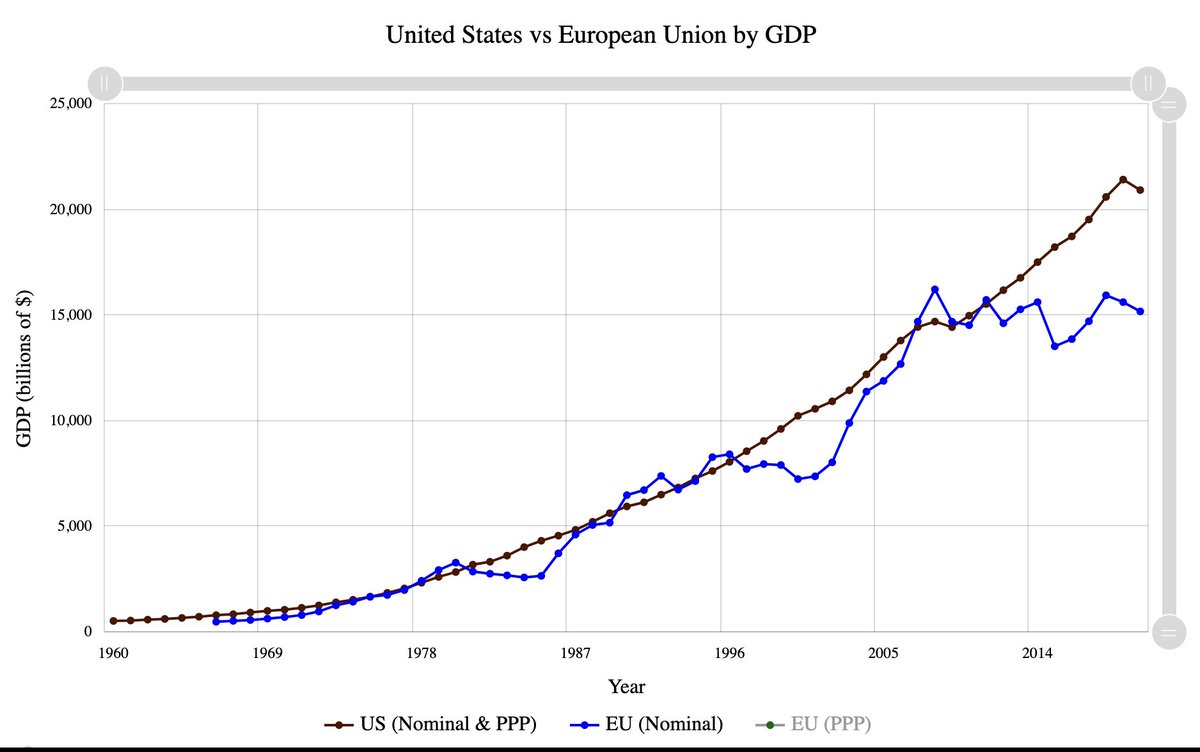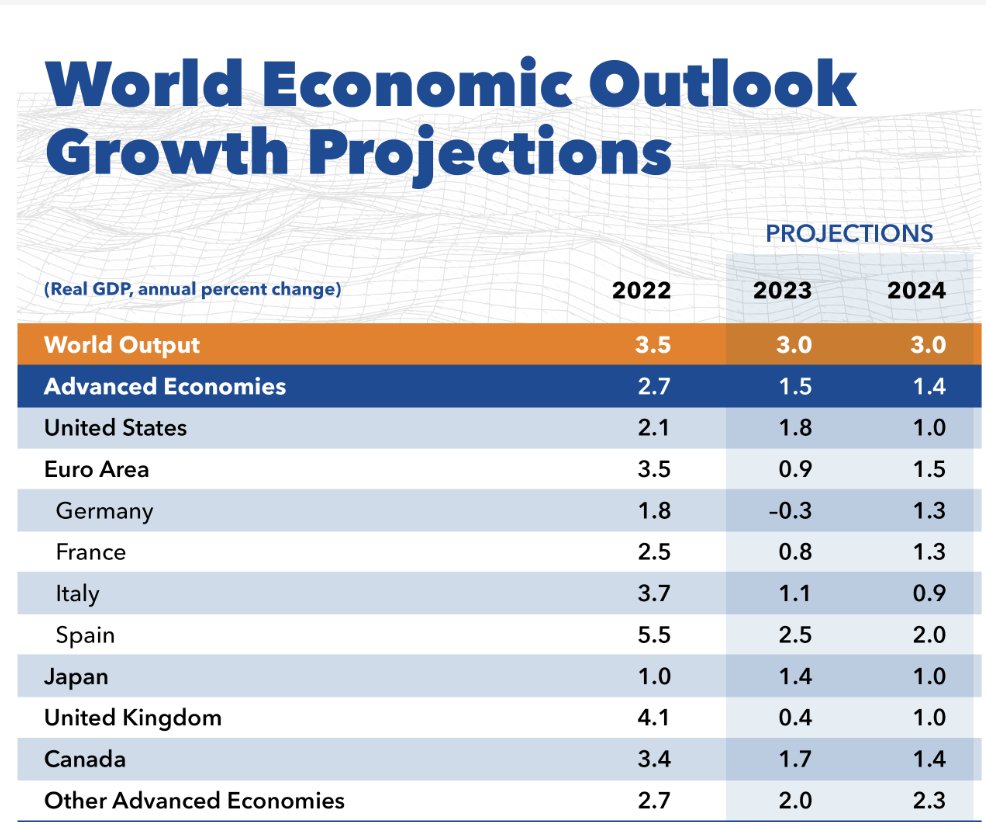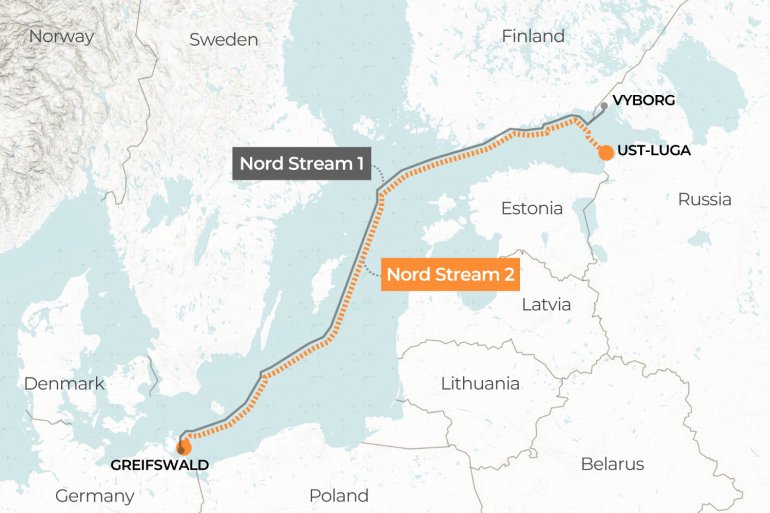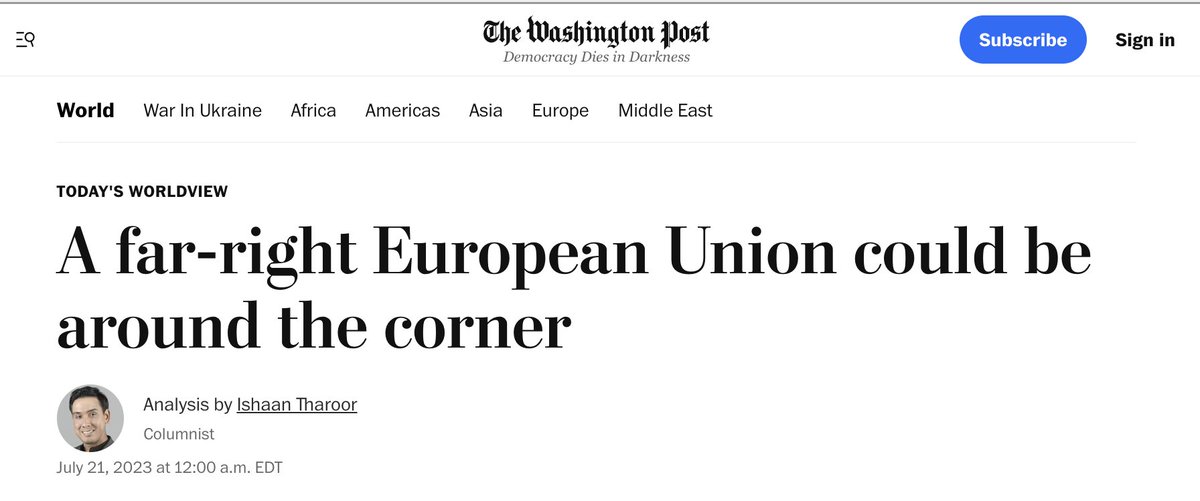🧵 The Ukraine war — or more precisely the West’s response to the latter — is causing Europe to deindustrialise at frightening speed. What’s worse, there is ample evidence that, from America’s perspective, this was the intended outcome all along.
THREAD.
compactmag.com/article/americ…
THREAD.
compactmag.com/article/americ…
1/ The Russia-Ukraine conflict has deeply transformed transatlantic relations, leading to a greater degree of European “vassalisation” (in the words of a recent @ecfr report) to the US than ever before.
ecfr.eu/publication/th…
ecfr.eu/publication/th…
2/ On geopolitical questions, as the current war has made clear, Brussels has no meaningful independence from Washington.
compactmag.com/article/how-am…
compactmag.com/article/how-am…
3/ In the economic sphere, Europe’s relative decline and growing dependency on America — which of course predate the Ukraine conflict, but have been massively exacerbated and accelerated by the latter — are if anything even more evident.
4/ In 2008, the European Union’s economy was slightly larger than America’s; today, America’s economy in 2023 is one-third larger than those of the European Union and Britain combined, and 50% larger than that of the European Union without the United Kingdom. 

5/ The economic fortunes of the EU and the US had already started to diverge well before the Ukraine conflict for several reasons, not least Europe’s post-2008 suicidal austerity policies. For an overview of the latter check out my book:
plutobooks.com/9781783710232/…
plutobooks.com/9781783710232/…
6/ Over the past year and a half, however, this process has undergone a dramatic acceleration. Unlike America, Europe has suffered a huge economic blowback from the conflict — or more precisely, from the West’s response to the latter (sanctions/decoupling from Russian gas).
7/ This drastic move led to a “massive and historic energy shock”, as the OECD put it, exacerbated by speculation on behalf of the big energy companies, which crippled industry and households alike.
oecd.org/newsroom/russi…
oecd.org/newsroom/russi…
8/ Last year, soaring energy prices and falling demand caused dozens of plants across a range of energy-intensive industries — glass, steel, aluminum, zinc, fertilisers, chemicals — to cut back production or shut down, which, in turn, led to mass layoffs.
intellinews.com/energy-crisis-…
intellinews.com/energy-crisis-…
9/ At the time, many pundits claimed these effects would be short-lived— that at some point energy prices would stabilise, and Europe’s economy would pick up once again. Well, wholesale gas prices have indeed recently stabilised at a much lower level than a year ago — but...
10/ ... they are still roughly triple what they were before the start of the crisis. Those same pundits are now starting to acknowledge that the policy decisions of the past 17 months have plunged Europe into a deeper (structural, in fact) crisis than they had predicted.
11/ The latest data show that industrial production is continuing to rapidly deteriorate across Europe due to persistently high energy prices, sluggish internal (and global) demand, and tightening credit conditions.
ecb.europa.eu/pub/economic-b…
ecb.europa.eu/pub/economic-b…
12/ According to a recent European Central Bank report, corporate-loan demand has fallen by 42% in the second quarter of this year, following a 38% drop in the first quarter, falling to an all-time low since the start of the survey in 2003.
ecb.europa.eu/stats/ecb_surv…
ecb.europa.eu/stats/ecb_surv…
13/ The ECB’s ultra-tight monetary policy — which shows no sign of abating — has certainly been a contributing factor. As a result, the IMF now forecasts that the eurozone will grow by a meagre 0.9% this year — compared to an estimated growth rate for the US of 1.8%. 

14/ But even that seems optimistic if we consider that the country that is suffering the most in Europe is also its largest and most important economy: Germany. According to the IMF, it is the only G7 country that will suffer a contraction this year.
bloomberg.com/news/articles/…
bloomberg.com/news/articles/…
15/ As an export-oriented economy centred around energy-intensive manufacturing industries such as automotives, and heavily dependent on the cost-competitiveness of its goods, Germany has been especially hard hit by the energy squeeze.
16/ But the German establishment largely brought this crisis on itself. Before the war, Germany received more than 50% of its gas from Russia (via the Nord Stream 1 pipeline, which runs from the Russian coast near Saint Petersburg to northeastern Germany). 

17/ Germany was also in the process of intensifying its economic relations with Russia. Prior to the war, Germany had invested heavily in the construction of a second pipeline parallel to the existing gas line, Nord Stream 2, which would have doubled annual capacity. 

18/ Nord Stream 2 was completed in 2021 and was expected to enter into service in 2022. After Russia’s invasion of Ukraine, however, Germany made a 180-degree policy U-turn, announcing that it would wean itself off Russian gas entirely by 2024.
bloomberg.com/news/articles/…
bloomberg.com/news/articles/…
19/ The opening of the Nord Stream 2 pipeline was halted. As for Nord Stream 1, it was put out of service by a bomb attack — likely green-lighted, if not directly carried out, by Washington. Here’s a good overview of what we know about the attack: bournbrookmag.com/nord-stream-fi…
20/ Germany, like other European countries, has scrambled to source gas from elsewhere, for example by buying more natural gas from Norway or the Netherlands, or by expanding its infrastructure for importing liquid natural gas from the United States and Qatar.
21/ But the combination of reduced gas flows and higher energy prices — compounded by Germany’s decision to shut down its last remaining nuclear reactors and by the ECB’s rate hikes — has dealt a massive blow to the country’s industry.
22/ The German manufacturing-purchasing-managers’ index, an indicator of economic health, has been in freefall — that is, in recession — since the start of 2022, and industrial output as a whole continues to stagnate: . https://t.co/HeJ7eL2Y6wdestatis.de/DE/Presse/Pres…


23/ No wonder more and more German companies are starting to look elsewhere in an attempt to reduce their operating costs — first and foremost energy. Several major German companies across all sectors have announced plans to downsize in Germany and move elsewhere (US and China). 

24/ According to The Economist, almost a third of German medium-sized firms are thinking about transferring production and jobs abroad; 1 in 6 is already doing it.
economist.com/business/2023/…
economist.com/business/2023/…
25/ All this is reflected in the shocking numbers recently reported by the Institut der Deutschen Wirtschaft (@iw_koeln), a German economic think tank, which show that foreign investment in Germany has all but collapsed.
iwkoeln.de/presse/pressem…
iwkoeln.de/presse/pressem…
26/ As the report notes, these are all clear signs of deindustrialisation. Even the mainstream media is now starting to pick up on this...
politico.eu/article/rust-b…
politico.eu/article/rust-b…
27/ The dire state of the German economy is a harbinger of economic doom for the continent as a whole. As noted already, though, German and European leaders largely have themselves to blame for this situation. They have unquestioningly deferred to US strategy in Ukraine...
28/ ... choosing to decouple from Russian energy and eagerly joining America’s proxy war. This is all the more astonishing considering that America’s fortunes have been inversely proportional to Europe’s: in relative...
29/ ... terms, America has grown stronger while Europe has grown weaker. Not only has the conflict represented an opportunity for Washington to reassert its military hegemony over Europe, through NATO...
nytimes.com/2023/07/11/opi…
nytimes.com/2023/07/11/opi…
30/ ... but it has also made Europe more economically dependent on America. There is reason to believe that, from Washington’s perspective, this was the intended outcome all along.
politico.eu/article/vladim…
politico.eu/article/vladim…
31/ Driving a wedge between Europe (and Germany, in particular) and Russia, and thereby preventing the rise of a Eurasian geopolitical reality, has long been an American geopolitical imperative.
.unherd.com/2022/10/did-am…
.unherd.com/2022/10/did-am…
32/ Prior to the war, European countries, and Berlin in particular, were brazenly challenging that imperative, as epitomised by the Nord Stream pipelines, which Washington always vehemently opposed.
2017-2021.state.gov/fact-sheet-on-…
2017-2021.state.gov/fact-sheet-on-…
33/ An alleged leaked report from the RAND Corporation (which has denied the document’s authenticity) seems to confirm that the European energy crisis wasn’t an accident but was indeed planned by the US.
nyadagbladet.se/utrikes/shocki…
nyadagbladet.se/utrikes/shocki…
34/ Regardless of whether the document is authentic, there is no doubt that an economically weakened European continent benefits America in the short term as it pursues a wider policy of deglobalisation, which involves not only decoupling from China...
34/compactmag.com/article/the-de…
34/compactmag.com/article/the-de…
35/ ... but rebuilding the country’s manufacturing capacity and making the United States self-sufficient in a series of strategic industries. In this context, Europe isn’t a strategic ally but a competitor and rival, which Washington has every interest in keeping subordinated.
36/ In other words, we are witnessing a process of intra-Western economic cannibalisation. It is hard to see how weakening an important strategic ally could be seen as a winning long-term strategy, but there you go.
If you enjoyed this thread, check out the article that it’s based on for a deeper dive. It’s paywalled but please consider subscribing to @compactmag_, one of the best current affairs magazines out there.
compactmag.com/article/americ…
compactmag.com/article/americ…
And if you like my writing, consider subscribing to my Substack: .tfazi.substack.com
• • •
Missing some Tweet in this thread? You can try to
force a refresh

 Read on Twitter
Read on Twitter










